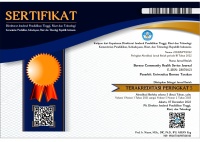OPTIMALISASI PEMBERDAYAAN MASYARAKAT POSBINDU PTM DALAM PENURUNAN FAKTOR RESIKO PENYAKIT TIDAK MENULAR
Siti Halimatul Munawarah, Misnaniarti Misnaniarti, Iwan Stia Budi, Asmaripa Ainy, Haerawati Idris, Rizma Adlia Syakurah, Dian Safriantini, Rudy Chendra, Alvera Noviyani
Abstract
Abstract
Currently, health problems in Indonesia are referred to as a double burden of disease because it is dominated by the development of Non-Communicable Diseases (NCDs) and on the other hand the incidence of infectious diseases that still occur. One of the strategic issues in the 2030 SDGs that must be a development priority in every country that requires cooperation in handling cross-sectors is NCDs, so a community-based NCDs control model is developed through Posbindu as a form of community participation as an effort to control risk factors independently and continuously. The role and function of Posbindu cadres are important as executors of NCDs risk factor control for the community. Therefore, to maximize the role of cadres in Posbindu, the Faculty of Public Health, University of Sriwijaya, empowers the Posbindu community through Posbindu cadres so that they can become self-reliant for the community to live healthily by increasing the capacity of Posbindu cadres. The community service team wanted to determine the effect of providing education and training to cadres on the knowledge and skills of Posbindu cadres in Bangun Jaya Village, Ogan Ilir Regency. The method used in this service is the education and training of 15 health cadres. Measurement of knowledge is done by using a questionnaire (pretest and posttest). The results of the activity showed that there was an increase in the knowledge and skills scores of cadres regarding Posbindu after education and intervention. However, there were also those with a fixed score. Continuous training is needed to improve cadres skills and optimize the community's active participation through Posbindu cadres.
Keywords: Cadres, Posbindu, NCDs, Knowledge, Skills
DOI:
https://doi.org/10.35334/neotyce.v3i2.4095
Refbacks
There are currently no refbacks.
This work is licensed under a
Creative Commons Attribution-NonCommercial 4.0 International License .
<div class="statcounter"><a title="hit counter" href="https://statcounter.com/" target="_blank"><img class="statcounter" src="https://c.statcounter.com/12792578/0/aee8b4c9/0/" alt="hit counter"></a></div>
Borneo Community Health Service (NEOTYCE) Journal
Borneo Community Health Service (NEOTYCE) Journal
FAKULTAS ILMU KESEHATAN UNIVERSITAS BORNEO TARAKAN
JL. AMAL LAMA, NOMOR 1, KELURAHAN PANTAI AMAL, KOTA TARAKAN 77123
Phone : (+62)82188737351
Email :bchs@borneo.ac.id
Laman : http://jurnal.borneo.ac.id/index.php/NEOTYCE
View My Stats
situs gacor

 Indexed by:
Indexed by:
.png)





